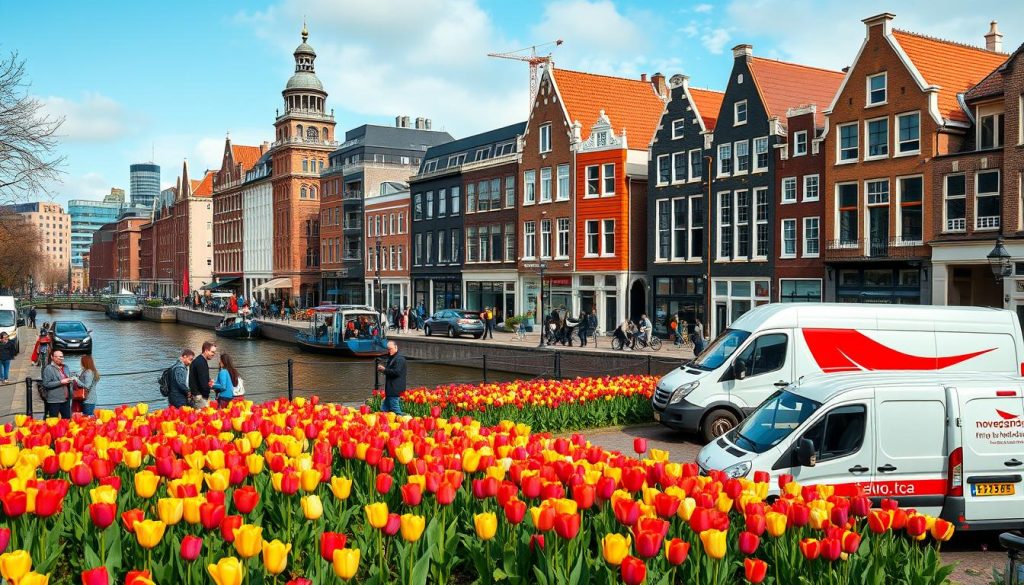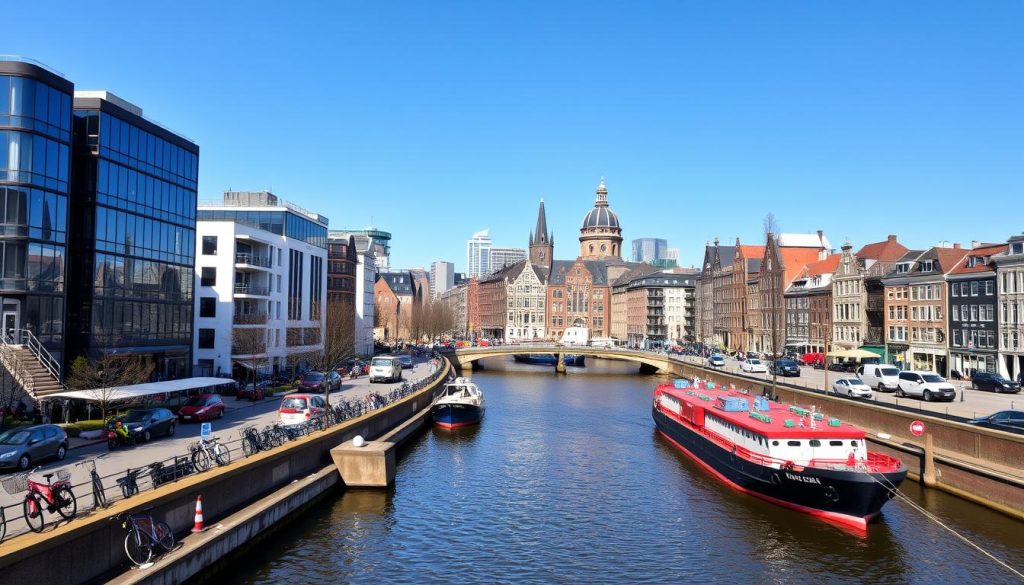The Netherlands presents a plethora of opportunities for entrepreneurs and established corporations, positioning itself as a prime location within Europe. Its economic strength and business-friendly environment make it an enticing choice for those contemplating relocation. This discourse aims to elucidate the pivotal elements of establishing a business presence in the Netherlands, offering indispensable guidance and insights. Such knowledge is crucial for a seamless transition into this dynamic and hospitable nation.
Understanding the Business Landscape in the Netherlands
The Netherlands’ business terrain is a dynamic arena, catering to both nascent and established entities. Its open, competitive market framework offers substantial support for growth and innovation. The economy’s diversity, encompassing sectors such as technology, logistics, finance, and agriculture, bolsters resilience and opens up a plethora of opportunities for relocation.
The Dutch economy’s tax regime is particularly attractive, with government incentives designed to attract both domestic and international businesses. This makes the Netherlands an exemplary destination for entrepreneurs seeking stability and support. Furthermore, the country’s highly skilled workforce ensures access to premier talent across various sectors.
Strong infrastructure is another significant factor enhancing the Netherlands’ appeal. Its efficient transport networks, encompassing both road and waterways, facilitate smooth logistics and supply chains. Entrepreneurs exploring opportunities in the Netherlands will find that connectivity with neighbouring countries significantly boosts their prospects for success.

In conclusion, the Netherlands emerges as a formidable platform for businesses aiming to flourish in a dynamic market. Grasping the nuances of the Netherlands’ business landscape is crucial for anyone contemplating a strategic move to this burgeoning environment.
Key Considerations for Business Relocation to Netherlands
Initiating business migration to the Netherlands necessitates a thorough examination of several critical factors. The imperative of understanding local regulatory frameworks cannot be overstated, as compliance directly impacts the legality and operational efficacy of ventures. This entails a comprehensive grasp of tax obligations, employment legislation, and sector-specific directives.
Exploring diverse funding avenues is another pivotal consideration. The Dutch government proffers a plethora of incentives and grants aimed at fostering foreign investment. Acquiring financial backing not only facilitates the transition but also fortifies business resilience in a fiercely competitive environment.
Analytical exploration of industry trends and market dynamics is indispensable for uncovering potential niches and avenues for expansion. Delving into local consumer preferences yields invaluable insights, enabling the tailoring of offerings to meet prevailing demands with precision.
Logistical considerations, such as the management of relocation logistics, are paramount for ensuring seamless operations. The evaluation of transportation networks, warehouse facilities, and office spaces significantly influences productivity and operational efficiency upon establishment in the Netherlands.
Cultural assimilation and the mitigation of language barriers are crucial for cultivating robust relationships with clientele and colleagues. Engaging with local customs and practices enriches the business experience, fostering superior networking opportunities.

Benefits of Expanding Business to Netherlands
Expanding a business to the Netherlands offers a plethora of advantages, significantly contributing to organisational growth and success. The country’s strategic geographic location facilitates direct access to European markets, thereby enabling companies to engage with a vast and diverse customer base. This positioning is pivotal for tapping into expansive market opportunities.
The Netherlands is renowned for its robust economy, characterised by innovation and a highly skilled workforce. This environment fosters favourable business opportunities, particularly in sectors such as technology, logistics, and green energy. The availability of substantial support and resources propels these sectors towards enhanced growth potential.
Moreover, the Netherlands is distinguished by its pro-business policies, actively promoting foreign investments through various incentives. This makes it an exceptionally attractive destination for international businesses. The country’s business-friendly environment simplifies market entry and encourages sustained investment, thereby fostering long-term growth.

Expatriates in the Netherlands also benefit from a superior quality of life. The country’s exemplary healthcare, education, and infrastructure facilitate employee well-being and productivity. This environment promotes a positive work-life balance, attracting elite talent from across the globe.
In conclusion, the Netherlands offers a multitude of benefits for businesses looking to expand. From enhanced market access and a supportive government to a high standard of living, it is evident why numerous enterprises consider relocating to this dynamic nation.
Relocating to Netherlands for business: The Legal Framework
For entrepreneurs contemplating a move to the Netherlands, grasping the legal prerequisites is paramount. The Dutch business framework is replete with regulations that must be meticulously navigated to ensure adherence throughout the relocation journey.
Initiating the process involves company registration, a critical step necessitating a filing with the Dutch Chamber of Commerce to acquire a unique registration number. This number acts as the business’s identifier within the country. Concurrently, an in-depth comprehension of tax obligations is imperative. The Netherlands proffers enticing tax incentives, yet strict adherence to local tax laws is essential to circumvent penalties.

Compliance with Dutch legislation also entails the acquisition of requisite permits and licenses. The regulatory requirements vary significantly based on the nature of business activities, necessitating a thorough understanding of the specific needs. Seeking legal counsel can prove invaluable in effectively traversing this intricate terrain.
In the realm of Netherlands business migration, being adequately informed about these legalities is not merely beneficial; it is indispensable for a seamless transition and the establishment of a robust foundation for future business prosperity.
Choosing the Right Location in the Netherlands
The act of selecting a location for a business venture is paramount to achieving success. The Netherlands, with its varied landscapes, offers a plethora of opportunities across different regions. Each city presents its own set of advantages, making it imperative for entrepreneurs contemplating relocation to the Netherlands to grasp these nuances. This understanding enables the alignment of business objectives with the most conducive environment.
Key Dutch cities for business include:
- Amsterdam: Renowned as the financial epicentre and cultural nucleus, it boasts a vast talent pool and superior infrastructure.
- Rotterdam: Renowned for its state-of-the-art port facilities, it is the quintessential location for logistics and international trade.
- The Hague: Home to numerous multinational headquarters, it is preferred for its government relations and legal services.
- Eindhoven: A technological and innovative hub, particularly in design and engineering.
Each city offers distinct opportunities and challenges. By meticulously evaluating specific requirements and comprehending the benefits of each locale, entrepreneurs can significantly boost their prospects of success within the Dutch market.

Netherlands Business Migration: Visa Options
For those contemplating Netherlands business migration, grasping the array of visa options for entrepreneurs is paramount. The Dutch government proffers multiple avenues, designed to ease the relocation journey for aspiring business founders.
The Startup Visa emerges as a preferred choice for innovative entrepreneurs. It enables foreign nationals to initiate a startup in the Netherlands, under the mentorship of a sanctioned Dutch facilitator. Eligibility hinges on a robust business plan and adequate financial backing to sustain oneself during the startup phase.
The Entrepreneur Visa, on the other hand, caters to those intent on establishing a mature business. It demands proof of substantial capital and a comprehensive business plan that showcases the venture’s potential to positively impact the Dutch economy. Securing this visa can pave the way for permanent residency after a few years.
The Knowledge Migrant Visa is another pivotal component in the Netherlands’ business migration framework, targeting high-calibre individuals. It mandates securing a job offer from a recognised sponsor in the Netherlands. This route is advantageous for entrepreneurs eager to introduce specialised skills or groundbreaking ideas to the Dutch market.
Comprehending these visa options for entrepreneurs is crucial for a seamless relocation to the Netherlands. Adequate support throughout the application process can circumvent potential hurdles, ensuring a fluid transition into the dynamic Dutch business sphere.

Setting Up Your Business in the Netherlands
The process of establishing a business in the Netherlands necessitates a series of practical actions, pivotal for a seamless transition post-relocation. Grasping the intricacies of the business relocation process is imperative, facilitating the simplification of these tasks and ensuring comprehensive coverage of all details.
Initially, selecting an appropriate business structure is crucial. Options range from sole proprietorships to partnerships and limited liability companies. Each structure offers distinct benefits, necessitating an evaluation to determine the most suitable for your business objectives.
Subsequently, crafting a detailed business plan is essential. This document should encapsulate your strategy, objectives, market analysis, and financial projections. A meticulously structured business plan serves as a critical tool for securing funding and as a guiding framework for your entrepreneurial venture.
- Register your business with the relevant authorities.
- Acquire any obligatory permits or licenses.
- Establish a dedicated bank account for your business transactions.
- Engage a local accountant to navigate tax obligations.

Networking emerges as a pivotal factor in accessing entrepreneurial opportunities in Netherlands. Establishing connections with local industry stakeholders is vital, fostering goodwill and potentially leading to fruitful partnerships. Participation in local business associations or attendance at industry events can significantly expand your professional network.
Adherence to these critical steps enables effective navigation through the complexities of establishing a business in the Netherlands. This approach paves the way for successful operations within this dynamic market.
Finding Relocation Services to Netherlands
For enterprises contemplating expansion into Europe, the Netherlands emerges as a prime destination, boasting a dynamic economy and a pivotal geographical position. The quest for adept relocation services to the Netherlands is paramount, as these entities offer a spectrum of support, from immigration counsel to logistical facilitation. This array of services is meticulously tailored to meet the multifaceted requirements of businesses in transition.
In the selection of a relocation service provider, it is imperative to evaluate their proficiency in areas critical to a seamless transition. Essential services may comprise:
- Expert consultancy on immigration and visa options
- Support with housing, encompassing temporary accommodations
- Logistical assistance, including transport and storage solutions
- Orientation services to facilitate the acclimatisation of new residents
- Networking opportunities to integrate into the local business community

Engaging with dependable business relocation services can significantly alleviate the complexities inherent in settling in the Netherlands for business purposes. With the appropriate support, the relocation process evolves from a formidable challenge to a manageable undertaking. This transformation empowers businesses to concentrate on their core activities while establishing a foothold in a novel market.
Networking Opportunities for Entrepreneurs in the Netherlands
The establishment of a thriving business in the Netherlands is predicated upon the cultivation of strategic alliances. The Netherlands offers entrepreneurs a plethora of networking opportunities, facilitating the development of indispensable relationships. Participation in diverse events and affiliation with organisations significantly augments visibility and fosters collaboration within the local market.

Engagement with professional bodies is paramount for entrepreneurs seeking to forge business connections in the Netherlands. These entities orchestrate conferences, meet-ups, and workshops specifically designed for entrepreneurs, enabling the exchange of insights and experiences. Notable organisations include:
- The Dutch Chamber of Commerce
- Startup Amsterdam
- TechLeap
- Various industry-specific associations
Business incubators also play a crucial role in supporting entrepreneurs in the Netherlands, offering a conducive environment for networking. These incubators provide mentorship, access to invaluable resources, and funding opportunities, thereby fostering entrepreneurial growth.
Furthermore, local trade shows and expos present entrepreneurs with the opportunity to showcase their products, engage with potential clients, and forge partnerships. These events create a vibrant atmosphere conducive to the flourishing of innovative ideas, potentially leading to the establishment of new ventures.
The establishment of a robust professional network is fundamental to navigating the Dutch business ecosystem. Entrepreneurs derive immense benefits from shared experiences, leading to advantageous collaborations and deeper market insights. The cultivation of these connections can catalyse growth and success in a highly competitive environment.
Understanding Dutch Business Culture
To excel in the Netherlands, it is imperative to comprehend the subtleties of Dutch business culture. This ethos champions direct communication, valuing honesty and clarity above all. Engaging in dialogue devoid of ambiguity is crucial for establishing trust with local counterparts and clientele.
The Dutch place immense value on work-life balance. Employees cherish their personal time, often preferring rigid working hours. Acknowledging this preference during interactions will be well-received, showcasing respect for their personal lifestyle.
Decision-making in the Netherlands is characterised by a consensus-driven approach. Meetings are prolonged, aiming to achieve collective agreement rather than imposing decisions from the top. This methodology promotes collaboration and cultivates a team-oriented atmosphere, essential for fostering effective partnerships.
When relocating, it is crucial not to overlook cultural considerations. Acquainting oneself with local customs, such as greetings and meeting protocols, facilitates smoother interactions. Recognising the importance of punctuality will also bolster your professional standing.

Financial Considerations for Business Migration
Embarking on a business relocation to the Netherlands necessitates a thorough examination of financial implications, which are pivotal to the venture’s success. Grasping the nuances of business costs in Netherlands is imperative for crafting a robust financial strategy.

- Registration Fees: Initial costs for registering a business typically start at €50.
- Tax Obligations: Familiarity with the local tax regime is necessary, including corporate tax rates and VAT.
- Operational Expenses: Rent, utilities, and salaries can vary widely, depending on location and industry.
- Funding Opportunities: Researching potential grants or financial support can alleviate some initial costs.
Delving into the intricacies of setting up finances in Netherlands transcends mere expense recognition. A meticulously devised budgeting and cash flow management strategy is crucial to maintain financial stability during the transition. Engaging with local financial advisors or accountants well-versed in Dutch regulations can significantly streamline this endeavour.
In conclusion, meticulous consideration of these financial aspects is indispensable for a seamless transition to conducting business in the Netherlands.
Support and Resources for Settling in Netherlands for Business
Embarking on the journey of establishing a business in the Netherlands necessitates the utilisation of diverse support mechanisms. Various entities are dedicated to providing critical assistance, designed to empower entrepreneurs in this dynamic environment. Below, we outline pivotal avenues for support:
- Government Agencies: The Dutch government’s initiatives are geared towards bolstering new ventures. The Netherlands Foreign Investment Agency (NFIA) extends its expertise to foreign entrepreneurs aspiring to set up operations within the country.
- Business Assistance Services: Chambers of commerce, situated locally, serve as indispensable assets. They proffer counsel on legal frameworks, facilitate networking, and elucidate market entry strategies. Engaging with these entities is paramount for navigating the intricacies of local regulations.
- Community Groups: An array of expat and entrepreneurial communities exists, offering indispensable support. These groups frequently host gatherings and provide networking avenues, thereby aiding newcomers in assimilating into the local business ethos.
- Online Resources: Websites focused on business support disseminate information pertinent to establishing a presence in the Netherlands. They encompass insights on taxation, employment legislation, and cultural acclimatisation.
The amalgamation of these support resources in the Netherlands can expedite the transition process. Leveraging the available business assistance services not only alleviates initial hurdles but also paves the way for sustained success within the Dutch market.

Success Stories: Entrepreneurs Thriving in the Netherlands
The Netherlands has emerged as a prime location for innovative entrepreneurs. Many individuals have successfully relocated, carving out substantial niches in various industries. Their journeys serve as insightful success stories Netherlands, motivating others who wish to pursue similar paths.
Consider the case of a digital marketing agency that began operations in Amsterdam. The founders, originally from the UK, leveraged local networking platforms to connect with established businesses. This connection facilitated lucrative partnerships, leading to notable business success in Netherlands. They attribute their success to understanding the unique needs of the Dutch market and adapting their strategies accordingly.
Another inspiring story comes from a local startup specialising in sustainable products. The entrepreneur, originally from Brazil, faced initial challenges entering a competitive market. By embracing the Netherlands’ strong eco-conscious ethos, they cultivated a loyal customer base. Their approach highlights how adaptable entrepreneurs in Netherlands can leverage cultural values for growth.
Here are key factors contributing to the success of these entrepreneurs:
- Emphasising local connections through networking events.
- Adapting business models to fit Dutch consumer preferences.
- Focusing on sustainability and social responsibility.
- Leveraging government incentives for start-ups.
Through these examples, the narratives of diverse individuals emphasise the potential for business success in Netherlands. Their experiences underline the importance of determination, adaptability, and strategic decision-making for entrepreneurs in the modern, competitive landscape.

Challenges of Business Relocation and How to Overcome Them
Embarking on a business relocation, particularly to a foreign jurisdiction such as the Netherlands, entails a myriad of challenges of relocation. Entrepreneurs often encounter numerous problems faced in business migration that can impede the transition process. Recognising these hurdles enables businesses to devise efficacious strategies for a more seamless relocation experience.

Common obstacles include bureaucratic impediments, such as obtaining requisite permits and adhering to local regulatory frameworks. These administrative tasks are often time-consuming and necessitate meticulous attention to detail. Engaging with local consultants or legal experts can facilitate the navigation of these complexities, ensuring timely compliance.
Cultural adjustments also present significant overcoming relocation obstacles. Variations in business practices, communication styles, and workplace etiquette can engender misunderstandings. Therefore, an emphasis on cultural training for employees and fostering an inclusive environment that values diversity is paramount.
- Establish clear communication channels to address any potential misunderstandings.
- Invest in workshops that educate staff about local customs and business norms.
- Encourage open dialogue among diverse teams to build rapport and trust.
Logistical complications, such as coordinating the physical move and securing suitable office space, further exacerbate the challenges faced. A detailed relocation plan is essential for managing these logistical elements, ensuring timely execution and efficient resource allocation.
In conclusion, by proactively addressing the problems faced in business migration, companies can significantly enhance their relocation journey. A strategic approach enables the challenges of relocation to be managed effectively, allowing businesses to flourish in their new environment.
Future Trends in the Dutch Business Environment
The Netherlands remains a beacon of innovation and advancement, navigating through significant business environment transformations. Entrepreneurs are poised to encounter substantial technological and sustainability breakthroughs, necessitating a keen awareness of emerging trends. The emphasis on green initiatives resonates with global sustainability objectives, presenting a wealth of opportunities for forward-thinking enterprises. Both start-ups and established entities can capitalise on these developments to refine their operational efficacy and draw in environmentally aware consumers.
The digital transformation has profoundly altered the global business terrain, with the Netherlands experiencing its own transformation. Companies are acknowledging the imperative of embracing digital solutions to maintain competitiveness. The application of artificial intelligence and the optimisation of supply chain processes exemplify the extensive scope for innovation. As these technologies progress, they unveil novel opportunities in the Netherlands for astute entrepreneurs to exploit, securing a competitive edge.
Grasping these trends is crucial for those contemplating a business relocation to the Netherlands. By forecasting these shifts and calibrating strategies accordingly, businesses can optimise their positioning for future triumphs. The forthcoming years herald a dynamic setting that prizes adaptability, innovation, and sustainability, presenting an opportune moment for entrepreneurs to leave their indelible mark in this burgeoning market.

